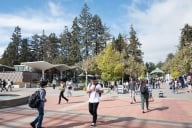You have /5 articles left.
Sign up for a free account or log in.
With some regularity in recent years, Bush administration officials have given speeches pledging their commitment to international education and to a smooth visa system for foreign scholars seeking to come to American universities.
There's just one problem. Cases continue to materialize in which scholars are kept out, leaving them and their American hosts frustrated and angry. There's the Canadian physicist who couldn't cross the border to attend a conference. A musicologist at Mills College has been unable to return there after she was turned away at the airport. It took two years (and a lawsuit) for the University of Nebraska at Lincoln to win a visa for one of its new faculty members. Add to those and a number of other cases the situation facing Marixa Lasso, an assistant professor of Latin American history at Case Western Reserve University.
Lasso's course for the fall -- on Latin American history -- has been called off. She's the only Latin Americanist in her department and she's stuck in Panama. Lasso is a Panamanian citizen, but she has had no trouble winning visas in the past or academic recognition in the United States. She won a Fulbright to study in the United States, earned her master's degree and Ph.D. at American universities and just saw her first book, Myths of Harmony: Race and Republicanism During the Age of Revolution, Columbia, 1795-1831, published by the University of Pittsburgh Press.
"Professor Lasso is a rising star in her field and we are lucky to have her on our faculty," said Jonathan Sadowsky, the history chair at Case Western. "This is a former Fulbright scholar who was here on a program designed to foster U.S. interaction with other cultures, who brings a real perspective to our department, who is being kept out. This is terrible."
The American Historical Association is among the groups that have recently weighed in on Lasso's behalf, with Barbara Weinstein, the president of the group, writing to the State Department, vouching for Lasso's work as an "outstanding scholar" and noting that all who know Lasso find it "astonishing" that her visa would now be held up. The Latin American Studies Association is also lobbying on her behalf.
In a phone call from Panama, Lasso said she too was astonished by what has happened. She travels to Panama regularly, to visit family members or to do research, and she went there after classes ended in the spring, planning to do research for the summer. In July, she went to the U.S. embassy for her visa renewal, which has always been routine in the past, and she was turned away -- not only was she unable to get her visa, but she couldn't get any explanation of why she was being placed in limbo. "They told me that some things changed, but they won't tell me what," she said.
Cyrus C. Taylor, dean of the College of Arts and Sciences at Case Western, said that officials there have also been unable to get any answer as to why Lasso would be suddenly unable to obtain a visa. The university is "gravely concerned" about the situation, but having difficulty figuring out its strategy when it doesn't know why Lasso was suddenly treated in a different way.
Leslie Phillips, a spokeswoman for the State Department, said Monday that it is policy not to discuss individual visa cases. She said that the U.S. government's position is that "everybody who is qualified for a visa should get the visa and if they are denied a visa, it is for a specific reason required by law." Asked how people could point out possible errors if they don't know why they were rejected, she repeated: "If a visa is denied, [consular officials] are following the rules as prescribed by law."
Lasso said she is left to wonder why she was placed on the barred list. Some Latin American scholars have expressed fear that they are suspect if they write about current political movements that may be critical of the United States. But Lasso specializes in the 19th century. "I'm writing about things that are 200 years old, about people who are very much dead," said Lasso. "We have no idea why they are doing this and we don't know where to go."
Case Western let Lasso move a research leave to this semester, so she is being paid and doing research. But she doesn't know what will happen in the future. Her husband works as a software engineer in Cleveland so she has been kept away from him as well.
"I'm just so disappointed," Lasso said. While she's been waiting, she said, she has kept hoping that someone would tell her "what's going on and what they need" so she can show she is a scholar who poses no threat. "But they won't tell me what's going on, so I can't do anything. That's what's so frustrating. I feel so weak and powerless."








